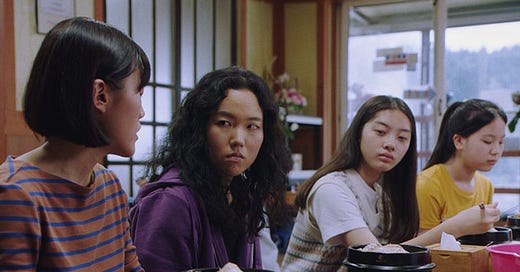Return to Seoul
This time-shifting drama looks at a Korean-French woman who keeps returning to her home country, ostensibly in search of her birth parents. Like its main character, it's hard to get to know.
In most movies, the main character is the most likeable one. We empathize with their plight, laugh or cry with them as they navigate whatever plot the film has set up for them to traipse through, and reach a resolution where their life is headed in a bold new, and usually positive, direction.
Of course, it would be pretty boring if every movie acted like that, so I’m appreciative of films where the protagonist is difficult and even has some unlikeable qualities. Fern from “Nomadland” is a terrific example of a character like this.
In “Return to Seoul,” though not only is the main character not likeable, she’s extremely off-putting and hard to grasp. She does things that are mysterious to other people, mostly because she herself does not have a clear grasp of why she acts the way she does.
Freddie (Park Ji-min) is a 25-year-old French woman who was adopted from South Korea as a baby. She has never been there and does not speak the language. But when a two-week trip to Japan goes awry, she is redirected to Korea and decides to spend time getting to know her motherland.
Of course, one of the first things she does is go to the Hammond adoption center to inquire after her birth parents. Despite her not having any kind of documentation, they are able to locate her father, who invites Freddie to come visit him and his family in the coastal area where he lives.
It’s not a pleasant stay. The father (Oh Kwang-rok) is clearly remorseful about having given his first-born child up for adoption, and is cloying and pitiful in his attempts to ingratiate himself with her. Freddie wears a mask of perplexed resentment the entire time, barely responds to his questions, and flees with barely a half-wave before jumping into a taxi.
Her two-week vacation ends with learning that her birth mother has declined to meet with her.
The story time-shifts, first two years into the future and then five more. We are surprised to learn that Freddie did stay in South Korea after all, learned the language and eventually entered a career as an arms merchant, selling missiles for an older Frenchman (Louis-Do de Lencquesaing) she had a hookup with via a dating app.
In the last section, Freddie and her Western boyfriend, Maxime (Yoann Zimmer), visit with her father again. Part of her still holds out hope of meeting her mother.
Freddie is a person who does not seem to have any sort of plan or strategy in life. She goes with the flow and tries to manipulate events to her mercurial whims.
For example, while dining in a restaurant during the first section with a French-speaking woman, Tena (Guka Han), who worked at her hotel, she arranges for random strangers to eat and drink together, even dictating where they sit to match up potential romantic pairs. She sleeps with one of them and then quickly disposes of him.
Psychologically, it’s pretty clear what’s happening with Freddie. She feels unrooted and abandoned, and her response to that is to push people away and make herself seem extravagantly independent.
But the particular cruelty Freddie employs to bolster this self-image is hard to empathize with. The victim become victimizer is not a person we find ourselves wanting to spend a couple of hours with.
At one point, while riding in the car with Maxime after meeting her father again, Freddie blurts out to him, “I could wipe you from my life with the snap of a finger.” And we believe her. This statement is in many ways her mantra.
Written and directed by Davy Chou, himself a French-Cambodian, “Return to Seoul” is a lot like Freddie: interesting and charismatic, but hard to get to know.






“…mostly because she herself does not have a clear grasp of why she acts the way she does.” This + the rest of the review, hit it spot-on for (some of) us transracial adoptees who never fit in, or do not know why we feel what we feel, and often do not feel relatable to peers or society as a whole. For that, I give it five-stars.